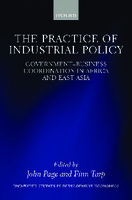The Practice of Industrial Policy: Government—Business Coordination in Africa and East Asia
| dc.contributor.editor | Page, John | |
| dc.contributor.editor | Tarp, Finn | |
| dc.date.accessioned | 2017-03-01 23:55:55 | |
| dc.date.accessioned | 2018-10-03 09:09:28 | |
| dc.date.accessioned | 2020-04-01T13:35:36Z | |
| dc.date.available | 2020-04-01T13:35:36Z | |
| dc.date.issued | 2017 | |
| dc.identifier | 628111 | |
| dc.identifier | OCN: 982017524 | en_US |
| dc.identifier.uri | http://library.oapen.org/handle/20.500.12657/31446 | |
| dc.description.abstract | Much of the information relevant to policy formulation for industrial development is held by the private sector, not by public officials. There is, therefore, fairly broad agreement in the development literature that some form of structured engagement—often referred to as close or strategic coordination—between the public and private sectors is needed, to assist in the design of appropriate policies and provide feedback on their implementation. There is less agreement on how that engagement should be structured, how its objectives be defined, and how success be measured. In fact, the academic literature provides little practical guidance on how governments interested in developing such a framework should go about doing it. The burden of this lack of guidance falls most heavily on Africa, where—despite twenty years of growth—lack of structural transformation has slowed job creation and the pace of poverty reduction. In 2014, the Korea International Cooperation Agency (KOICA) and United Nations University World Institute for Development Economics Research (UNU-WIDER) launched a joint research project: The Practice of Industrial Policy. The aim is to help African policy makers develop better coordination between public and private sectors in order to identify the constraints to faster structural transformation and design, implement, and monitor policies to remove them. This book, written by national researchers and international experts, presents the results of that research by combining a set of analytical ‘framing’ essays on close coordination with case studies of successful and unsuccessful efforts at close coordination in Africa and in comparator countries. | |
| dc.language | English | |
| dc.subject.classification | thema EDItEUR::K Economics, Finance, Business and Management::KC Economics::KCD Economics of industrial organization | en_US |
| dc.subject.classification | thema EDItEUR::K Economics, Finance, Business and Management::KC Economics::KCG Economic growth | en_US |
| dc.subject.classification | thema EDItEUR::K Economics, Finance, Business and Management::KC Economics::KCM Development economics and emerging economies | en_US |
| dc.subject.classification | thema EDItEUR::K Economics, Finance, Business and Management::KN Industry and industrial studies | en_US |
| dc.subject.other | policy formulation | |
| dc.subject.other | structural transformation | |
| dc.subject.other | africa | |
| dc.subject.other | industrial development | |
| dc.subject.other | public and private sectors | |
| dc.subject.other | industrial policy | |
| dc.subject.other | Special economic zone | |
| dc.title | The Practice of Industrial Policy: Government—Business Coordination in Africa and East Asia | |
| dc.type | book | |
| oapen.identifier.doi | 10.1093/acprof:oso/9780198796954.001.0001 | |
| oapen.relation.isPublishedBy | b9501915-cdee-4f2a-8030-9c0b187854b2 | |
| oapen.relation.isFundedBy | 4fa593cb-7f3c-4c04-a5d7-ebddd1ea1f0d | |
| oapen.relation.isbn | 9780198796954 | |
| oapen.pages | 336 | |
| oapen.place.publication | Oxford, UK | |
| oapen.grant.program | UNU WIDER | |
| oapen.remark.public | Relevant Wikipedia pages: Industrial policy - https://en.wikipedia.org/wiki/Industrial_policy; Private sector - https://en.wikipedia.org/wiki/Private_sector; Special economic zone - https://en.wikipedia.org/wiki/Special_economic_zone | |
| oapen.identifier.ocn | 982017524 |

